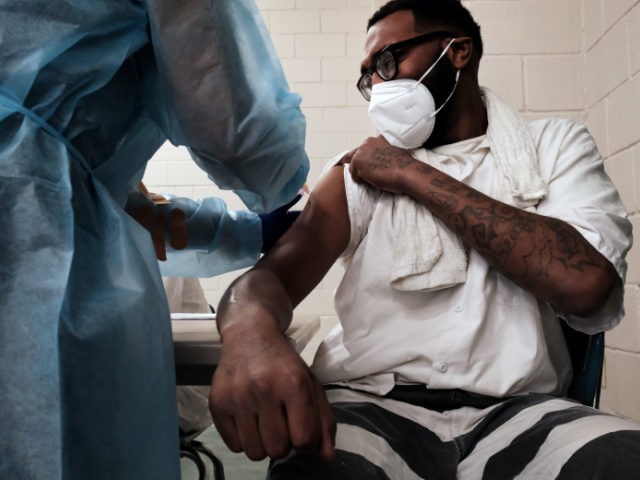Two New York judges ordered defendants, whose cases were related to minor crimes and drug offenses, to get vaccinated against the Chinese coronavirus,” the New York Times reported on Monday.
According to the report:
In one case, Judge Jeffrey Zimmerman of the Bronx County criminal court, explained that the defendant, William Gregory, had been accused of crimes — including drug possession, criminal trespass, shoplifting and criminal contempt — that showed he had placed his own interest above others in getting the vaccine, the judge argued, Mr. Gregory would be doing the opposite, and so vaccination would represent a form of rehabilitation.
In the second case, which was a week later, federal Judge Jed S. Rakoff for the Southern District of New York granted Elouisa Pimental release on the condition she get the coronavirus jab. She was originally charged with conspiracy to distribute fentanyl. According to the Times:
Judge Rakoff argued that it fell to him to determine whether a person seeking release represented a danger to their community. The unvaccinated, he wrote, did pose such a danger, given their “enhanced risk of infecting other, innocent people and even potentially causing their deaths.”
While neither defendant “appeared to object,” legal observers quoted by the Times said the two judges’ orders “raise important questions about the line between civic responsibility and civil liberties.”
Cheryl Bader, a professor at the Fordham University School of Law, said she felt there was a “potential hole” in Judge Rakoff’s underlying logic.
“[Rakoff] was tasked with evaluating a defendant’s danger to the community, but not in a general sense — in connection with the criminal charges in question. And the danger of spreading the virus was not clearly connected to the distribution of fentanyl,” the Times wrote of Bader’s observation.
Stephen Gillers, an expert in legal ethics at the New York University School of Law, said Rakoff’s ruling was likely fair, as long as Ms. Pimental was not being coerced to get the vaccine regardless of health issues or “legitimate religious objections.”
“Those aside, I think that this requirement fits within the broader category of the judge’s responsibility for the safety of individuals or the public generally,” Gillers said.
On the order in Gregory’s case, Nadine Strossen, a professor at New York Law School, said Judge Zimmerman made his order about Gregory’s “personal improvement” despite the vaccine having nothing to do with the crimes he had been accused of.
“That made it seem to me like an abuse of discretion,” she said. “That the judge has this guy in his power and he can impose whatever hobbyhorse is important to him.”
Strossen, who was the president of the American Civil Liberties Union (ACLU) from 1991 to 2008, said that a lawyer would have to show that a judge abused their discretion in order to go against a vaccination directive. Strossen cited a case the ACLU filed in 2003 to reverse the order of a Michigan judge to make a woman take birth control after being accused of neglecting her children. The ACLU contended that the judge violated the woman’s constitutional right to privacy, and the case was later rescinded when it reached the state’s court of appeals.
Gillers said judges should use their power over other people’s lives “sparingly.”
“Zimmerman is saying, as a judge, I’m going to help you be a better person. And I don’t think that’s his job. As a therapist, perhaps, but not as a judge,” he said.

COMMENTS
Please let us know if you're having issues with commenting.